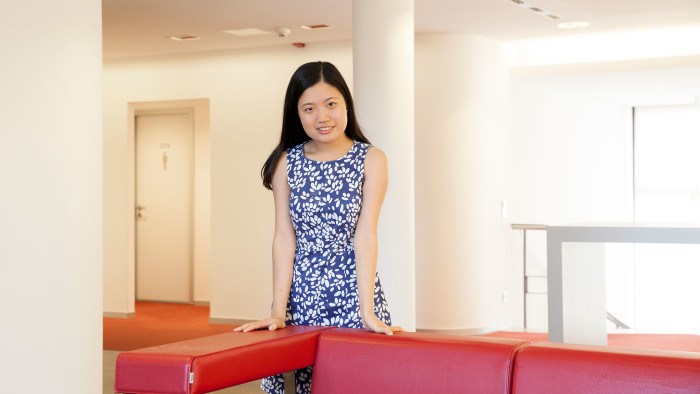Schools debate traditional female popularity of masters in management

Roula Khalaf, Editor of the FT, selects her favourite stories in this weekly newsletter.
For Yuxiao Zhong, a student at Stockholm School of Economics, her masters degree was both a way to study overseas and to earn an additional certificate. “Many women in China pursue a masters degree because they feel they need the higher qualification,” she says. “I don’t think this is only in China.”
Zhong worries that male recruiters often require women applicants to provide this additional endorsement, but not men. “For some industries you may need higher degrees to balance for gender,” she says.
Whether fact or perception, this is a concern also voiced by Andrew Crisp, joint founder of CarringtonCrisp, the education marketing specialists. He points to his company’s research that shows a third of women who enrol on pre-experience masters degrees do so to improve their employability, compared with 28 per cent of men. The difference of five percentage points is small but cannot be dismissed, Crisp argues.
He believes that “women undergraduates feel they have to try a bit harder to get into the workplace. They feel a masters is necessary for their first job. It is a terrible thing, really. Whether it comes from parents, society, peers . . . there is still a level of discrimination in the workplace. We know it’s better than it was, but you wonder how long it will take to change.”
Why women enrol in some management degrees rather than others has long been a hot topic among business school deans. Many point to the high number of women in pre-experience masters degrees as a model that admissions officers in other degrees, notably the MBA, might investigate. Traditionally, only a third of participants in MBAs have been women; by comparison, in the 95 programmes listed in the Financial Times’ 2017 Masters in Management Ranking, 48 per cent of the enrolled students are female.
So why are pre-experience masters degrees so popular among women? Apart from the additional qualification, these degrees may better equip female students for the careers they hope to pursue. Some of the most persuasive data from the CarringtonCrisp research show that women want to specialise in different areas of management to men.
Among their top 10 chosen areas for future employment, women list human resources and business law, for example, topics absent from the equivalent list from their male peers. Masters in management degrees give women the basic general management skills they need for entry-level jobs in such fields. Men, on the other hand, are keen on entrepreneurship, big data and business analytics.

At Nova School of Business and Economics in Lisbon, Rita Cunha, deputy dean for pre-experience studies, says that on graduation, women are more likely than men to find jobs in human resources or in the fast-moving consumer goods sector. Yet she can find no single reason for this disparity. “I don’t have a good, clean answer, I’m afraid. Maybe it is because success is often associated with money for men, not so much for women,” she says.
Cunha points to academic research that suggests higher levels of testosterone are linked to lower levels of risk aversion, perhaps indicating why men are more likely to opt for riskier careers in finance or entrepreneurship — and do MBAs.
“What Women Want: A Blueprint for Change in Business Education”, a report published this year by the Graduate Management Admission Council, also suggests status and money have more influence on men than women. Men are more likely to cite income and recognition as more important than having a job they like.
Another significant finding of the report was that 30 per cent of women in the US and 16 per cent in Europe cite obtaining funds to study at graduate level as their biggest challenge, compared with just 9 per cent and 12 per cent for men in the two regions. The fact that fees are lower for pre-experience programmes than MBAs, and that students do not give up lucrative careers to pursue them, could be other reasons for their popularity with women.
Whatever the causes, differences in aspirations — arguably along with gender pay discrimination — mean women receive lower salaries than men, even at this early stage. According to FT data, women earn an average of $38,000 after graduating with an MiM, compared with $47,000 for men. Three years after graduation, men’s pay has increased by 50 per cent to $70,000, while women’s is up 43 per cent to $55,000.
More granular research shows that even though the trend is for women to favour pre-experience degrees, this also varies by country. French business school Skema teaches its masters in management degree on four continents and reports that there are significantly lower proportions of women applicants from both India and north Africa.
It is perhaps not surprising, then, that just 16 per cent of students on IIM Calcutta’s Postgraduate Programme in Management are women, the lowest proportion for all schools in the FT’s ranking in 2017.
Why Manchester is a magnet for aspiring female consultants

Leaving Mexico for the UK to study at the University of Manchester’s Alliance business school, Violeta Aradillas Flores had little idea that 79 per cent of the 95 participants on the business analysis and strategic management degree would be women, the highest percentage of all the programmes in the Financial Times’ 2017 Masters in Management ranking.
Flores suggests that the hands-on consultancy project that so attracted her might be one reason why so many women, with an eye to a consultancy career, choose the programme.
It is a view endorsed by MiM director Matthew Allen. He is tentative about forwarding explanations for the appeal of pre-experience degrees for women, but suggests a relatively high proportion of female faculty at Manchester (38 per cent) may play a part.
Whatever the reason, the move has paid off for Flores. She is already planning an import business when she returns home to Mexico, working with a female classmate from Sri Lanka.
Comments